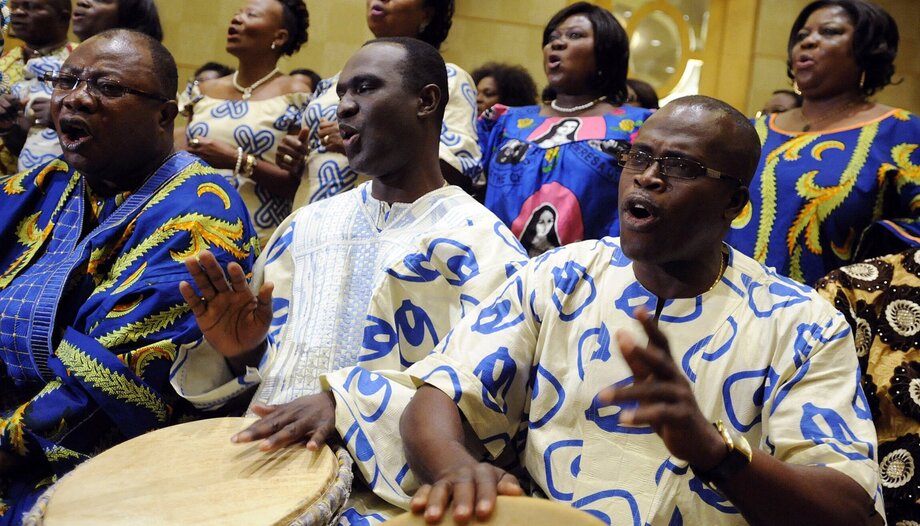









The event brought together close to 3,000 people, including laity, clergy and organizations representing the various African-American Catholic communities in the country. The event featured presentations, lectures, discussions, as well as Masses and moments of prayer. The theme of the congress was inspired by Habakkuk 2, 2-3: "Write the vision: a prophetic call to prosper". According to the organizers: "We know that God is always speaking somewhere, so we must go to that place and listen to what God is calling us to do in order to act justly and in the ways of the Lord".
The Congress opened on July 21 with a Mass at the National Basilica of the Immaculate Conception in Washington D.C.. Cardinal Wilton Gregory, Archbishop of Washington, D.C., presided. Concelebrating at the liturgy were, among others, Cardinal Sean O'Malley, Archbishop of Boston; Archbishop Timothy P. Broglio, Archbishop of Boston; Msgr. Timothy P. Broglio, Archbishop of the United States Military Services and President of the North American Conference of Catholic Bishops, as well as 130 priests and 60 permanent deacons from 80 dioceses in the country. In his homily, Cardinal Gregory noted that Jesus offers us a redemptive vision of freedom, the freedom of God the Father, and calls all people to holiness. "Jesus chose disciples - ordinary men and women - and entrusted them with that life-changing redemptive vision. It is a treasure that we must share with all people," he said. In this regard, the cardinal alluded to six African-American Catholics whose causes are being analyzed for beatification and canonization, among them Venerable Mother Mary Elizabeth Lange, who in 1829 founded in Baltimore, Maryland, the first congregation of African-American women: the Oblate Servants of Providence; and Venerable Father Augustus Tolton, the first black American Catholic priest to be beatified and who participated in the first African-American Congress in 1889.
The inaugural ceremony was attended by the Apostolic Nuncio to the Holy See in United Statessaid Msgr. Christophe Pierre, who read a message from Pope Francis. In his letter, the pontiff exhorted the congress participants to be witnesses of the joy of the Gospel and to build the kingdom of God as missionary disciples of Jesus in the world. William Lori, Archbishop of Baltimore, who was one of the delegates at this congress, indicated that the event is of vital importance for the archdiocese, as it allows "the African-American Catholic community to come together to meet and share their gifts, as well as to discuss pastoral needs, plan evangelization and even foster transformation in the life of the church".
This congress had a session dedicated to young people with the participation of Cardinal Gregory and the Bishop Emeritus of Memphis, Tennessee, J. Terry Steib. In their speeches, the prelates responded spontaneously to questions posed by the young people and thus referred to their vocation to the priesthood and the issue of racism. The Archbishop of Washington invited the young people to discover their vocation: "What does God want you to do? What would make you happy in life? What if one of those dreams were to give your life to the service of the Church? The cardinal also noted that in his life he has experienced racism: "Yes. I have experienced racism, but I have also seen how people change. My classmates in the seminary were all white. But it was an opportunity for them and for me to meet," adding that these experiences serve to help people get out of their comfort zones to get to know and recognize themselves.
This congress concluded on July 23 with a "Mass of Sending" presided over by Msgr. John H. Ricard, bishop emeritus of the Diocese of Pensacola-Tallahassee and since 2019 superior general of the Society of St. Joseph of the Sacred Heart, Josephites. In his homily, he encouraged the congressmen to bring the fire of the Holy Spirit to their African-American communities: "Light that flame and fan it. Don't let the fire go out," he said. Ricard also referred to the legacy left by the six African-Americans whose causes for beatification and canonization are in process: "This weekend we are here reaping what they sowed." In addition, Msgr. Ricard evoked the memory of African-American journalist Daniel Arthur Rudd, who was one of the founders of the Congress of African-American Catholics, first meeting in Washington in 1889. That founding group, Ricard said, "had the vision, the determination and the will to come together. Daniel Rudd believed that in the Catholic Church was the fullness of revelation and therein lay the answer to all the problems facing African-Americans at that time," he said.
Throughout its history this congress has also been dedicated to addressing issues affecting the African American community as a whole, on issues such as racial justice, economic inequality and disparities in health care and education. In that regard the Congress has made important contributions to the church and society by acting as a unifying force in the African American Catholic community.
Ciudad Juarez












